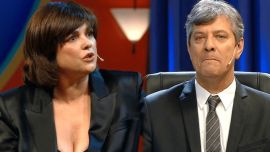Latin American countries are divided on Russia's aggression towards Ukraine, with most condemning military action but a few asserting Moscow's "right to defend itself" against perceived NATO encroachment.
On Thursday, the United States called on the region to condemn the Russian offensive. "We urge all countries in the hemisphere to condemn Russia's premeditated, unprovoked and unjustified attack and its immediate withdrawal from the conflict zone," said US diplomatic chief for the Americas Brian Nichols, noting that some nations had already done so.
Critics
Mexico and Brazil, the two non-permanent UN Security Council members from Latin America, are closely watching events. Both condemned Thursday's invasion of Ukraine, along with Argentina, Colombia and Chile.
Mexican President Andrés Manuel López Obrador said that his nation will work to “promote dialogue.”
Mexico is "very clearly against the use of force, against challenging the integrity of an independent country which is Ukraine," added Foreign Minister Marcelo Ebrard.
"Mexico rejects the use of force and strongly condemns the Russian invasion of Ukraine and demands the cessation of hostilities,” said Ebrard.
Brazil's Foreign Ministry also called for the "immediate cessation of hostilities," though President Jair Bolsonaro avoided criticising Russia.
In a message on social media, the Brazilian president said his government "is interested in deepening its friendly and commercial ties with other countries," citing Russia, Ukraine and Hungary.
Vice-President Hamilton Mourão later told reporters that "Brazil is not positioning itself as neutral. Brazil made it very clear that it respects Ukraine's sovereignty. So Brazil does not agree with an invasion of Ukrainian territory."
From Buenos Aires, Argentina called for an end to "military actions in Ukraine." The Casa Rosada said it rejected “the use of armed force” and called on “the Russian federation to cease” its operations and de-escalate the conflict.
Colombia's President Iván Duque on Twitter denounced "the premeditated and unjustified attack that has been perpetrated against the Ukrainian people by Russia," which he said threatened "world peace."
There are 68 Colombians living in Ukraine and 28 foreigners who are part of their families. The government announced diplomatic efforts to "facilitate" their "exit from Ukrainian territory" as soon as possible, said Duque.
Chile's outgoing President Sebastián Piñera condemned "the armed aggression of Russia and its violation of the sovereignty and territorial integrity of Ukraine," while urging Moscow to “respect the Geneva conventions on international humanitarian law.” Incoming president-elect Gabriel Boric offered a similar condemnation of the conflict.
Ecuador, Paraguay, Honduras, Guatemala, Uruguay and Peru also spoke out against the use of military force and called for a diplomatic solution.
"Ecuador believes in multilateralism and is willing to respect and support the decisions taken by the UN Security Council," the country's president, Guillermo Lasso, said on Thursday.
Allies
Russian allies Nicaragua, Venezuela and Cuba – all targets of United States sanctions – have defended Moscow's position in recent days, with some adding further comment in the wake of Thursday's invasion.
On Wednesday, Venezuela's President Nicolás Maduro had taken to Twitter to "repudiate the perverse plans that seek to surround Russia militarily and strategically" and expressed "support for President Putin and his people."
Following the invasion, Maduro added that Venezuela “rejects the worsening of the crisis in Ukraine as a result of NATO’s breach of the Minsk agreements.”
A government statement called “for a return to the path of diplomatic understanding through effective dialogue between the parties involved in the conflict to avoid escalation."
Communications Minister Freddy Ñáñez wrote on Twitter that "the aim of the operation is to protect people who have been abused and genocided by the neo-Nazi regime for eight years," echoing the Krelin’s official line.
Daniel Ortega of Nicaragua on Monday accused the United States and Europe of "using Ukraine to provoke Russia," which he said was merely "demanding security."
As events escalated, the leader expressed his support and “solidarity” with the “people of Russia and President Putin” in its “struggle” for “peace.”
On Wednesday, Cuba's President Miguel Díaz-Canel, while meeting a Russian official in Havana, invoked Russia's "right to defend itself" and expressed solidarity with Moscow in the face of "sanctions and the expansion of NATO towards its borders."
He later expressed “solidarity with Russia in the face of the imposition of sanctions and NATO's expansion towards its borders.”
– TIMES/AFP


























Comments